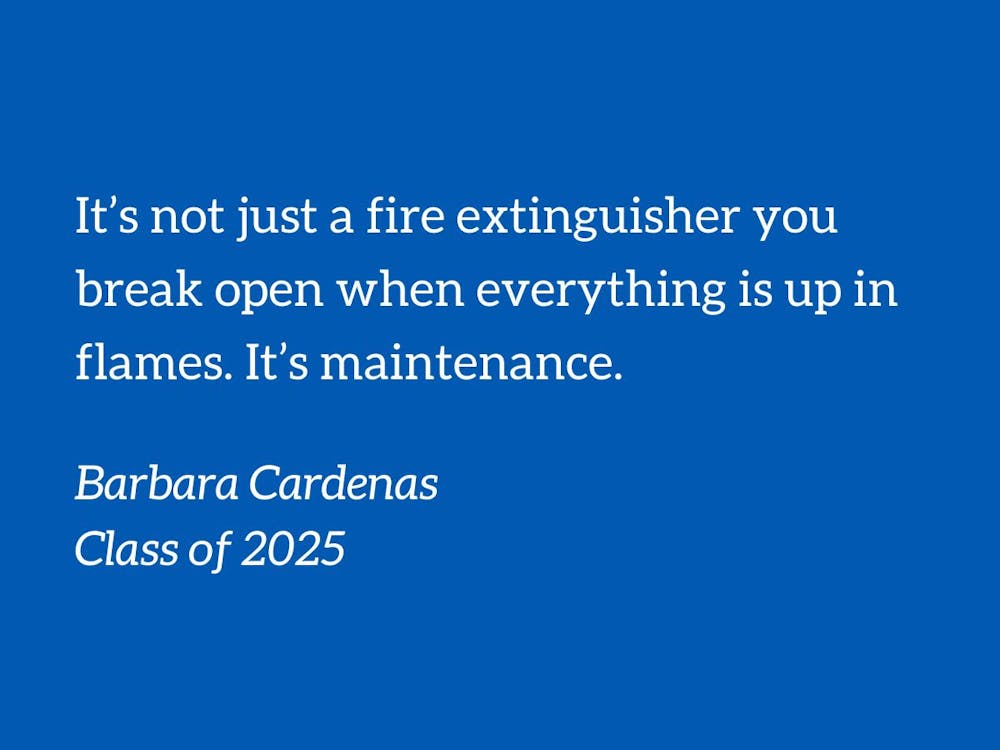Two and a half years ago, in the middle of my sophomore year, I hit my lowest low. I don’t mean that in a poetic, reflective way, I mean it in the most literal sense. I was barely sleeping, my appetite had disappeared and I was moving through my days on autopilot, hoping no one would notice how unwell I was. Eventually, after a nudge from a close friend back then, I did what I thought was my only option: I reached out to Counseling and Psychological Services (CAPS), Duke’s mental health resource for students.
At the time, therapy felt like an emergency measure, like calling 911 when you’re bleeding out. I needed someone to help me function, to pull me out of the deep hole I had fallen into. I was embarrassed. But, to an extent, it worked. I started therapy, worked through what I could, and when I began to feel like myself again, I stopped. I told myself I didn’t need therapy anymore because I wasn’t actively drowning. That’s the purpose of therapy, right? You go when things are bad, and when everything is good, you move on.
I was wrong.
Fast forward to now, my senior year. By all measures, I’m at my highest high. I have an incredible support system, exciting opportunities ahead and a strong sense of who I am. I feel happy in a way I didn’t think was possible back then. And yet, for some reason, something in me said, “You should go back to therapy.” Or maybe that "something" was actually a friend from home who wouldn’t shut up about how therapy changed his life, and after hearing his 30-minute TED Talk on emotional growth, I started to wonder if he had a point.
At first, I dismissed the thought. Why would I need therapy when things were finally going well? Wasn’t it selfish to take up space when someone else might need it more? But the more I thought about it, the more I realized that therapy isn’t just for crisis mode. It’s not just a fire extinguisher you break open when everything is up in flames. It’s maintenance. It’s checking in with yourself even when things are good. It’s making sure that the habits and patterns that helped you survive your worst moments don’t end up holding you back in your best ones.
Here’s why I went back to therapy — and why you should consider it too:
- Therapy isn’t just for emergencies: It’s a common misconception that therapy is only for people in crisis. Research shows that therapy helps people develop better emotional regulation skills, improves relationships and even increases overall life satisfaction.
- Self-awareness is a lifelong process: Therapy isn’t about “fixing” yourself; it’s about understanding yourself. I realized that even though I was happy, I still had underlying fears, anxieties and thought patterns that could hold me back if I didn’t work on them. Therapy helped me uncover and navigate those thoughts.
- Your brain deserves a tune-up, just like your body does: Just like you wouldn’t wait until you’re physically sick to take care of your health, mental health should be proactive. Studies show that regular therapy can improve cognitive function, reduce stress and lower the risk of developing serious mental health conditions.
- You don’t have to do it alone: Even with the best support system, there’s something different about having a trained professional help you process things objectively. Friends and family are great, but they aren’t therapists. A therapist provides a space where it’s just about you — no judgments, no expectations, just understanding.
- Therapy makes good moments even better: The best thing I’ve learned since going back to therapy is that it’s not just about avoiding breakdowns — it’s about making sure you’re thriving. It’s about learning how to truly enjoy your happiness without fearing it will be taken away. Therapy teaches you to embrace your good moments and make the most of them.
CAPS gave me a space where I could finally say things out loud that I had been keeping bottled up. My therapist wasn’t just a sounding board, she helped me untangle my thoughts, figure out why I was feeling the way I was, and actually do something about it. The process of getting started was easy, which was a relief because when you’re struggling, even sending an email can feel like climbing a mountain. And honestly, just knowing that there was a place at Duke where I could go, sit down, and be heard without judgment made all the difference.
Going back to therapy has been one of the best decisions I’ve made. I’m learning to navigate success without fear and to embrace happiness without waiting for the other shoe to drop. I’m unlearning the idea that I need to be in distress to deserve help. And I wish I had understood that sooner.
So, if you’re reading this and thinking, “I feel fine, I don’t need therapy,” I’d encourage you to reconsider. Therapy isn’t just for when you’re at rock bottom, it’s for making sure you don’t get there again. It’s for understanding yourself, growing and being proactive about your mental health. You don’t need a crisis to deserve support. You don’t need to justify taking care of yourself.
I went back to therapy because I realized that my mental health deserves attention at every stage of my life, not just the hardest ones. And if you’ve been considering therapy (even if you feel okay!) I hope you give yourself that same grace. You deserve it.
Barbara Cardenas is a Trinity senior. Her pieces typically run on alternating Fridays.
Get The Chronicle straight to your inbox
Sign up for our weekly newsletter. Cancel at any time.

